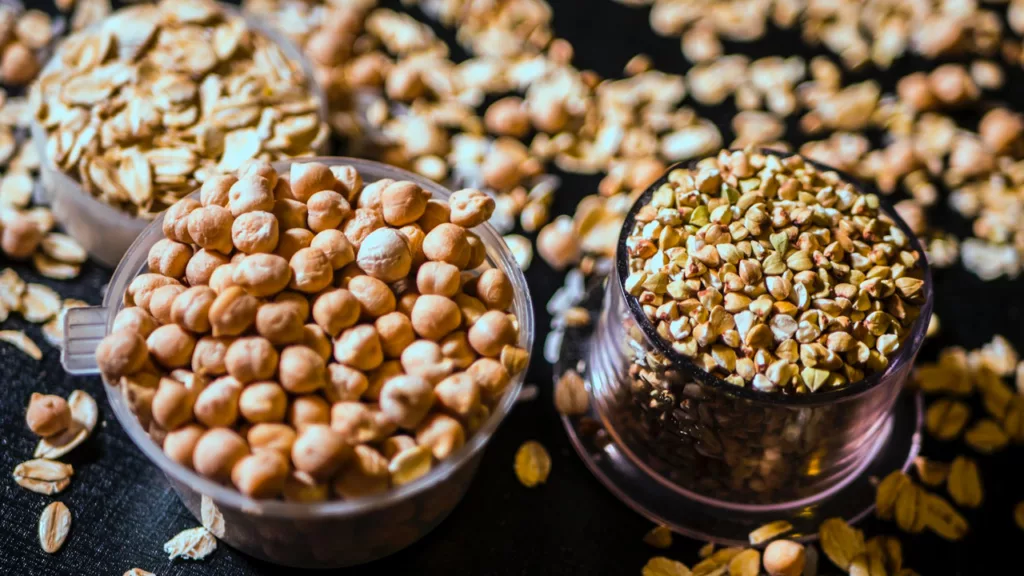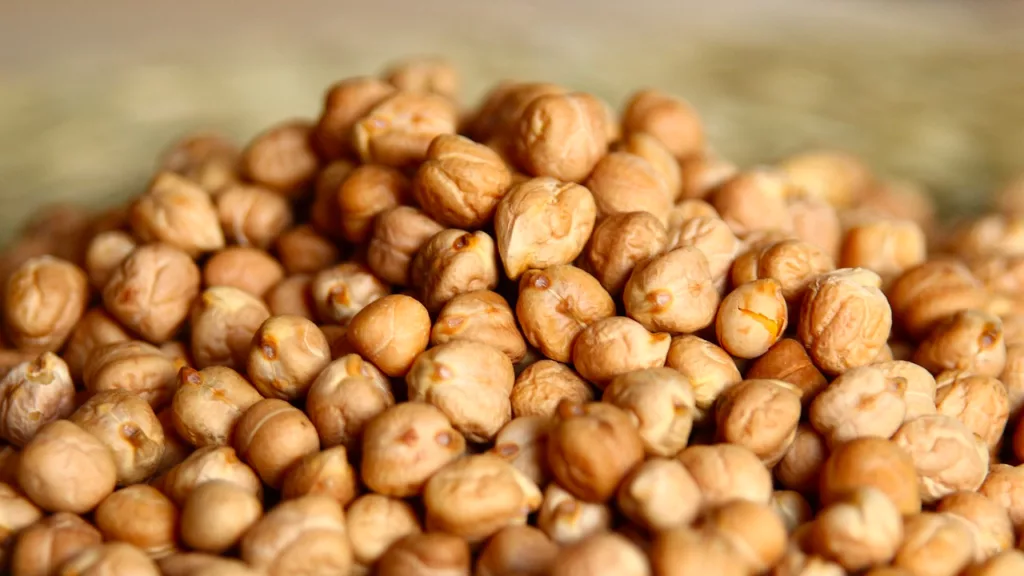Vitamin B6, also known as pyridoxine, is a vital nutrient that plays an important role in numerous bodily functions. It is a water-soluble vitamin that supports the immune system, brain function, and energy production.
For those following a plant-based diet, obtaining adequate amounts of vitamin B6 can be challenging, as it is primarily found in animal products. However, there are many plant-based foods rich in this nutrient that can help vegans meet their dietary needs. This comprehensive guide explores the top vegan sources of vitamin B6, its benefits, and how to incorporate it into your diet.
Benefits of Vitamin B6
Vitamin B6 is crucial for various bodily functions, including:
- Protein Metabolism: B6 plays a crucial role in the metabolism of protein and amino acids, making it essential for muscle growth and repair.
- Neurotransmitter Synthesis: It aids in the production of neurotransmitters such as serotonin and dopamine, which are vital for mood regulation and nervous system function.
- Immune Function: B6 supports the formation of red blood cells and enhances the body’s ability to fight infections.
- Energy Production: It is involved in the metabolism of carbohydrates and fats, providing the body with energy.
- Heart Health: B6 helps reduce high levels of homocysteine, an amino acid linked to an increased risk of heart disease.
Top 10 Vegan Sources of Vitamin B6
Here are the top 10 vegan sources of Vitamin B6, essential for protein metabolism, neurotransmitter synthesis, and immune function. The values are based on the USDA FoodData Central database and are for raw or uncooked foods.
| Rank | Food | Serving Size | Vitamin B6 (mg) |
|---|---|---|---|
| 1 | Chickpeas | 1 cup | 1.1 |
| 2 | Pistachios | 1 oz | 0.7 |
| 3 | Prunes | 1/2 cup | 0.3 |
| 4 | Avocado | 1 medium | 0.3 |
| 5 | Potatoes | 1 medium | 0.3 |
| 6 | Spinach | 1 cup | 0.2 |
| 7 | Bananas | 1 medium | 0.4 |
| 8 | Sunflower seeds | 1 oz | 0.4 |
| 9 | Sweet potatoes | 1 medium | 0.4 |
| 10 | Bell peppers (red or green) | 1 medium | 0.2 |
Additional Vegan Sources of Vitamin B6
In addition to the top 10 sources, here are more plant-based foods that can help boost your vitamin B6 intake:
Fortified Cereals and Grains:
Many vegan breakfast cereals and whole grains are fortified with B6. Check the nutrition labels to find those with added B vitamins, making them a good choice for breakfast or snacks.
Legumes and Beans:
Legumes like navy beans, lentils, and soybeans are excellent sources of B6. Incorporate them into soups, salads, and stews for a nutritious meal. You can also blend them into dips like hummus.
Nuts and Seeds:
Dry roasted pistachio nuts, sunflower seeds, and hemp seeds are rich in B6 and make perfect additions to smoothies or snacks.
Fruits and Vegetables:
Fruits such as bananas, prunes, and avocados, and vegetables like potatoes, sweet potatoes, spinach, and red bell peppers are good sources of vitamin B6. Include them in your daily meals and snacks to meet your B6 needs.
Nutritional Yeast:
This popular vegan food is often fortified with B6 and other B vitamins. It adds a cheesy flavor to dishes and can be sprinkled on popcorn, pasta, or salads.
Expanding Your Vitamin B6 Intake: Additional Plant-Based Sources and Their Benefits
Incorporating a variety of plant-based sources into your diet can help you meet your daily vitamin B6 requirements and support overall health. Here’s a look at more 6-rich foods and their benefits:
Sesame Seeds and Nuts:
Sesame seeds are not only a tasty addition to many dishes but also a good source of vitamin B6. Including a sprinkle of sesame seeds in your salads, stir-fries, or baked goods can boost your intake of this essential nutrient. Nuts like almonds and walnuts are also beneficial as they provide healthy fatty acids alongside vitamin B6.

Leafy Greens:
Dark leafy greens such as spinach, kale, and Swiss chard are rich in vitamin B6 and other essential nutrients like vitamin C, iron, and folic acid. Adding these greens to your daily meals, whether in salads, smoothies, or sautés, can significantly contribute to meeting your daily requirements.
Grains and Seeds:
Whole grains such as wild rice and whole-wheat flour, along with seeds like hemp seed, are excellent plant-based sources of vitamin B6. They also offer other nutrients like fiber, protein, and essential fatty acids that support overall health. Incorporating these grains and seeds into your diet can help ensure you get enough vitamins daily.
Fortified Foods:
Many plant-based foods, such as cereals, bread, and plant-based milk, are fortified with vitamin B6 and other B vitamins. Checking the nutrition labels for these fortified options can help you easily incorporate more B6 into your diet. Fortified foods are particularly helpful in achieving the recommended daily value of B6 and other essential nutrients.
Vegetables and Fruits:
Beyond the commonly known sources like bananas and avocados, vegetables such as Brussels sprouts and shiitake mushrooms are also good sources of vitamin B6. Including a variety of fruits and vegetables in your diet ensures you get a wide range of vitamins and minerals. Which supports your nervous system, energy production, and overall health.
Legumes and Beans:
As mentioned earlier, legumes like navy beans, chickpeas, and lentils are rich in B6 and other nutrients like protein and fiber. These plant foods are versatile and can be used in various dishes, from soups and stews to dips and spreads.
Other Sources:
Incorporating small amounts of wheat germ, cayenne pepper, and nutritional yeast into your meals can add a nutritional boost. These foods are not only high in B6 but also provide other vitamins and minerals that support a healthy vegan diet.
Understanding the Importance of Vitamin B6
Vitamin B6 is crucial for many bodily functions, including the metabolism of protein and amino acids, the formation of red blood cells, and the maintenance of healthy nervous systems. It also plays a role in the synthesis of neurotransmitters, which are vital for brain health and mood regulation.
Risks of Vitamin B6 Deficiency
A deficiency in vitamin B6 can lead to various health issues, including:
- Anemia: Due to its role in red blood cell production, a lack of B6 can cause anemia, leading to fatigue and weakness.
- Mood Disorders: Low B6 levels can affect neurotransmitter synthesis, resulting in mood swings, depression, and irritability.
- Skin Conditions: Deficiency may cause dermatitis, cracking and inflammation of the skin, and hair loss.
- Cognitive Decline: Adequate B6 levels are important for brain health, and a deficiency may lead to cognitive decline and memory issues.
- Immune System: A lack of B6 can impair immune function, making the body more susceptible to infections.
Ensuring Adequate Intake
To ensure you are getting enough vitamin B6:
- Diversify Your Diet: Include a variety of plant-based sources such as legumes, nuts, seeds, whole grains, and leafy greens.
- Consider Fortified Foods: Use fortified plant-based foods to help meet your daily requirements.
- Monitor Your Health: Regular blood tests can help monitor your vitamin B6 levels and ensure you are meeting your dietary needs.
- Consult Healthcare Providers: If you have medical conditions or dietary restrictions, consult with a healthcare provider to determine if you need nutritional supplements.
Plant-Based vs. Animal-Based Sources of Vitamin B6
When comparing plant-based and animal-based sources of vitamin B6, there are several factors to consider. Including; bioavailability, nutritional profile, and overall health impacts. Both types of sources can provide adequate vitamin B6. But their differences can influence dietary choices, especially for those following specific diets.
Bioavailability and Nutritional Profile
Animal-Based Sources:
Animal-based foods such as chicken breast, fish, turkey, and dairy products are considered some of the best sources of vitamin B6. These foods typically provide high levels of bioavailable vitamin B6. Meaning the body can absorb and utilize the nutrient more efficiently. For example, a serving of chicken breast can offer around 0.5 mg of vitamin B6. Which is a significant portion of the recommended daily intake.
In addition to vitamin B6, animal foods often contain other essential nutrients such as vitamin D, vitamin B12, and nicotinic acid (vitamin B3). However, relying heavily on animal-based foods can also increase the intake of saturated fats and cholesterol. Which may contribute to a higher risk of heart disease and other health issues.
Plant-Based Sources:
Plant-based sources of vitamin B6, such as chickpeas, bananas, nuts, seeds, and whole grains, are rich in other beneficial nutrients. Including fiber, antioxidants, and various vitamins like pantothenic acid and vitamin C. While plant-based foods may provide smaller amounts of vitamin B6 per serving compared to animal foods. They contribute to a well-rounded, nutrient-dense diet that supports overall health.
For instance, a cup of chickpeas contains about 1.1 mg of vitamin B6, which is nearly the entire daily requirement for adults. Incorporating a variety of plant-based foods can ensure an adequate intake of vitamin B6 and other nutrients on a daily basis.
Health Impacts
Animal-Based Diets:
Diets rich in animal-based foods can be effective in preventing deficiencies in vitamin B6 and other B vitamins. However, these diets may also carry some health risks. Higher consumption of animal-based foods has been associated with an increased risk of chronic diseases such as cardiovascular disease and certain cancers. Additionally, individuals who consume large amounts of animal products may face challenges related to ethical concerns, environmental impact, and health insurance costs related to treating diet-related diseases.
Plant-Based Diets:
Plant-based diets, when well-planned, can provide sufficient vitamin B6 and other essential nutrients while promoting overall health and reducing the risk of chronic diseases. People following plant-based diets often have lower cholesterol levels, better heart health, and a lower incidence of certain cancers. However, it’s crucial for those on a plant-based diet to pay attention to their vitamin B6 intake, as well as other nutrients like vitamin B12 and iron, to prevent deficiencies.
Meeting Daily Requirements
To ensure you get enough B6 on a plant-based diet, it’s important to include a variety of good sources of vitamin B6. Here are some tips:
- Incorporate Legumes and Beans: Foods like chickpeas, lentils, and soybeans are excellent plant-based sources of vitamin B6.
- Add Nuts and Seeds: Sunflower seeds, sesame seeds, and pistachios can boost your vitamin B6 intake.
- Include Whole Grains: Foods like brown rice, wild rice, and whole-wheat flour are beneficial.
- Enjoy Fruits and Vegetables: Bananas, avocados, spinach, and bell peppers can help you meet your daily vitamin B6 needs.
- Use Fortified Foods: Look for fortified cereals, bread, and plant-based milks to help meet your dietary vitamin requirements.
In the United States, the recommended daily value of vitamin B6 for adults is around 1.3-2.0 mg, depending on age and sex. It’s crucial to aim for this intake on a daily basis to support various bodily functions, including metabolism, brain health, and immune function.
Both plant-based and animal-based foods can provide adequate vitamin B6 when included as part of a balanced diet. While animal foods often offer higher bioavailability, plant-based foods contribute to a broader range of health benefits and support a sustainable, ethical lifestyle. By understanding the differences and incorporating a variety of sources, individuals can ensure they meet their vitamin B6 needs and maintain overall health.
Summary
Vitamin B6 is an important nutrient that supports numerous bodily functions, including protein metabolism, immune function, and brain health. For those following a plant-based diet, incorporating a variety of B6-rich foods is essential to meet daily requirements and prevent deficiency symptoms. By including a mix of legumes, nuts, seeds, grains, and leafy greens in your diet, you can ensure you get adequate vitamin B6 and maintain overall health. Always consider your unique dietary needs and consult with healthcare professionals for personalized advice.
Incorporating Vitamin B6 into Your Diet
Here are some ideas to help you incorporate more vitamin B6-rich foods into your daily meals:
Breakfast: Start your day with a bowl of fortified cereal topped with sliced bananas and a sprinkle of sunflower seeds. Alternatively, try a smoothie made with spinach, avocado, and a handful of pistachios.
Lunch: Enjoy a hearty chickpea salad or a lentil soup. Both are excellent ways to boost your B6 intake while enjoying a nutritious meal.
Snacks: Keep dry roasted pistachio nuts or sunflower seeds handy for a quick and healthy snack. Prunes and bananas also make for convenient and B6-rich snack options.
Dinner: Prepare a meal featuring sweet potatoes, spinach, and bell peppers. These vegetables can be roasted, steamed, or added to stir-fries for a delicious and nutritious dinner.
Dessert: Try making a prune-based dessert, such as a prune and nut energy bar or a prune compote to serve with your favorite vegan yogurt.
Importance of Vitamin B6 for Vegans
For vegans, ensuring an adequate intake of vitamin B6 is essential to prevent deficiency symptoms such as mood swings, irritability, depression, and fatigue. It also supports the formation of red blood cells and helps maintain healthy homocysteine levels, reducing the risk of cardiovascular diseases.
Understanding Deficiency Symptoms
Vitamin B6 deficiency can lead to several health issues, including:
- Anemia: Due to its role in red blood cell production, a lack of B6 can cause anemia.
- Mood Disorders: Low levels of B6 can affect neurotransmitter synthesis, leading to mood swings, depression, and irritability.
- Skin Conditions: Deficiency may cause dermatitis and other skin disorders.
- Cognitive Decline: Adequate B6 levels are important for brain health, and a deficiency may lead to cognitive decline and memory issues.
Recommended Dietary Allowance
The recommended dietary allowance (RDA) for vitamin B6 varies by age, gender, and life stage. For adults, the RDA is approximately 1.3 to 1.7 mg per day. Pregnant and breastfeeding women may require higher amounts. It is important to consume a variety of foods to meet these requirements and avoid high doses of supplements unless advised by a healthcare provider.
Addressing High Levels of Homocysteine
High levels of homocysteine in the blood are associated with an increased risk of heart disease. Vitamin B6, along with folic acid and vitamin B12, helps convert homocysteine into methionine, an essential amino acid, thereby reducing its levels and promoting cardiovascular health.
Nutritional Supplements
While it is best to obtain nutrients from whole foods, some individuals may benefit from nutritional supplements, especially if they have medical conditions or dietary restrictions that make it difficult to meet their vitamin B6 needs through diet alone. Always consult with a healthcare provider before starting any supplementation.
Conclusion: Vegan Sources Of Vitamin B6
Incorporating vitamin B6-rich foods into a well-planned vegan diet is crucial for maintaining overall health and preventing deficiency symptoms. By including a variety of legumes, nuts, seeds, fruits, vegetables, and fortified foods, vegans can ensure they get enough of this important nutrient. A balanced diet that includes these sources will support immune function, brain health, and energy metabolism, helping you stay healthy and vibrant.
Sources: Vegan Sources Of Vitamin B6
- Healthline – “10 Vegan Foods High in Vitamin B6” – https://www.healthline.com/nutrition/vegan-vitamin-b6-foods
- The Spruce Eats – “Vitamin B6 in a Vegetarian Diet” – https://www.thespruceeats.com/vitamin-b6-in-a-vegetarian-diet-3378456
- Verywell Fit – “The Top 10 Foods High in Vitamin B6” – https://www.verywellfit.com/vitamin-b6-rich-foods-2507071
- Medical News Today – “What are the best food sources of vitamin B-6?” – https://www.medicalnewstoday.com/articles/219662
- HealthAliciousNess – “Top 10 Foods Highest in Vitamin B6” – https://www.healthaliciousness.com/articles/foods-high-in-vitamin-B6.php
- NutritionData – “Foods highest in Vitamin B6 (pyridoxine)” – https://nutritiondata.self.com/foods-000102000000000000000-1.html




